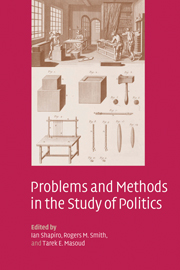Book contents
- Frontmatter
- Contents
- List of contributors
- Acknowledgments
- 1 Introduction: problems and methods in the study of politics
- Part I Description, explanation, and agency
- Part II Redeeming rational choice theory?
- Part III Possibilities for pluralism and convergence
- 12 The illusion of learning from observational research
- 13 Concepts and commitments in the study of democracy
- 14 Problems chasing methods or methods chasing problems? Research communities, constrained pluralism, and the role of eclecticism
- 15 Method, problem, faith
- 16 Provisionalism in the study of politics
- 17 What have we learned?
- Index
- References
16 - Provisionalism in the study of politics
Published online by Cambridge University Press: 22 September 2009
- Frontmatter
- Contents
- List of contributors
- Acknowledgments
- 1 Introduction: problems and methods in the study of politics
- Part I Description, explanation, and agency
- Part II Redeeming rational choice theory?
- Part III Possibilities for pluralism and convergence
- 12 The illusion of learning from observational research
- 13 Concepts and commitments in the study of democracy
- 14 Problems chasing methods or methods chasing problems? Research communities, constrained pluralism, and the role of eclecticism
- 15 Method, problem, faith
- 16 Provisionalism in the study of politics
- 17 What have we learned?
- Index
- References
Summary
Introduction
At a panel on the state of the discipline at the 2001 meeting of the American Political Science Association, Professor David Laitin said that political theory plays an indispensable role in contemporary political science, because it provides the foundational questions that the rest of the field tries to answer (Laitin 2001a). For Laitin, however, political theory's continuing relevance is a sign of political science's immaturity (Laitin 2001b: 24). Political theory's function of “accounting for and justifying different public outcomes” should be taken up by political science generally. Such investigators, he argues, may do better than theorists have been doing lately, as they may avoid getting mired in “diversionary tacks inducing us to grapple with ontologies or epistemologies” (23).
Laitin's vision for a theory-free political science fails to account for the special nature of political science's object of inquiry: political actors are historically constituted, limited rational beings in the process of making their collective worlds. What differentiates a political science that includes theory from a “purified,” “positive” political science is this: only the former can account for its object of inquiry qua constructor of value. However, Laitin's point about diversionary tacks applies all too well, both to political theory and to the discipline of political science as a whole. In focusing too narrowly on subdisciplinary methodological issues, political scientists and political theorists alike have missed opportunities to address political questions of broad, substantive interest (cf. Isaac 1995).
- Type
- Chapter
- Information
- Problems and Methods in the Study of Politics , pp. 350 - 376Publisher: Cambridge University PressPrint publication year: 2004
References
- 2
- Cited by



